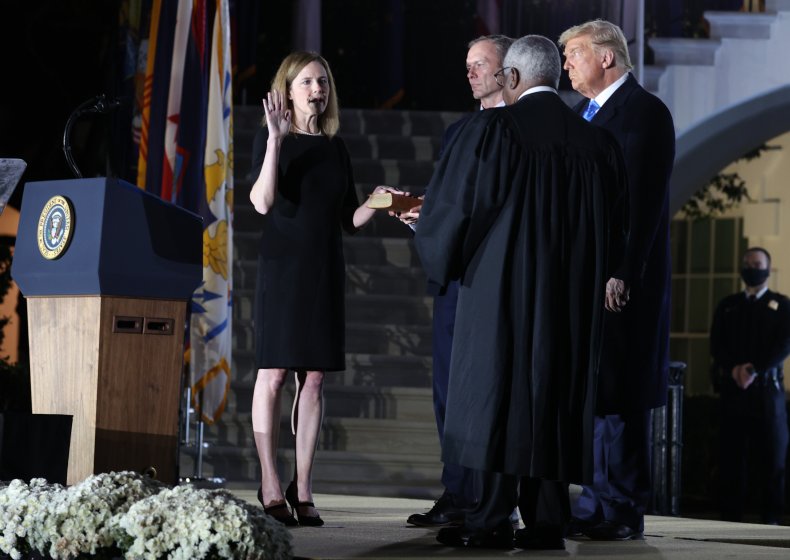The confirmation of then-Judge Amy Coney Barrett to a lifetime appointment on the United States Supreme Court has been a long time coming. All told, nights and weekends included, it’s been, give or take a day, about 33 years.
In 1987, when Justice Lewis Powell announced his resignation from the high court, the Democrats went to war. They made federal judicial confirmations—hitherto staid, formal and collegial affairs—into battle royales.
The opening shots were fired by the late Sen. Edward M. Kennedy of Massachusetts, who took to the Senate floor to assault the character of the man chosen as Powell’s replacement: Judge Robert Bork, a former U.S. solicitor general and distinguished professor of law at Yale.
Thus, the judicial nomination process was forever changed. Ever since, each party has blamed the other for starting it all. In reality, most of the blame lies with the Democrats, who, after the politics of personal destruction proved so effective against Bork, have repeatedly used smears, insinuations and arguments about character to try to keep conservative originalists off the federal bench. Sometimes, when Democrats controlled the Senate, they wouldn’t give Republican nominees the courtesy of even a hearing. Contrary to what you’ve heard, it didn’t start with Merrick Garland—ask Miguel Estrada, Priscilla Owen or any of the other George W. Bush judicial picks whose nominations to the various appellate courts were held up or blocked completely due to partisan concerns.
Each time the battle over the courts escalated, it was Democrats who almost always drew first blood. It was Democratic Senate Majority Leader Harry Reid who made it possible to force lower court confirmations through with 51 votes, rather than 60, and who used that power to stack the U.S. Court of Appeals for the D.C. Circuit—second in influence only to the U.S. Supreme Court—with appointments made by President Barack Obama.

Now, over the screams, complaints, wailing and gnashing of teeth from progressives who fear what is in store for their agenda, Judge Amy Coney Barrett has become Justice Amy Coney Barrett, thanks in no small part to the way these same opponents rigged the system to operate in their favor. There’s some justice in that.
Everything about her nomination and confirmation was legal, fair and according to the rules as they now are—thanks to Kennedy, Reid and others who corrupted the process. Fortunately for them, Justice Barrett—while she provides the crucial fifth vote to establish something of an originalist majority, as well as being the sixth vote for a center-right one—has not taken her new post with the intention of rewriting the Constitution according to her personal values.
She made that clear after she took her oath of office, saying:
“It is the job of a senator to pursue her policy preferences. In fact, it would be a dereliction of duty for her to put policy goals aside. By contrast, it is the job of a judge to resist her policy preferences. It would be a dereliction of duty for her to give into them. Federal judges don’t stand for election. Thus, they have no basis for claiming that their preferences reflect those of the people. This separation of duty from political preference is what makes the judiciary distinct among the three branches of government.”
The Democrats still intend to pack the high court, if they are able to do so. If able, they will attempt to add enough justices to allow the court to make policy for a generation or more. They will find within the Constitution, no doubt, the rights to health care, free public education, taxpayer-funded abortion on-demand, strict regulation and limitation of the private ownership of firearms, compulsion of workers to join unions and whatever else is on their political agenda that doesn’t pass muster with the voters. Instead of pausing, they’ll push on through, eliminating the restrictions on government and expanding its reach. If they succeed.
If they don’t succeed, America finally has the chance to put part of the genie back in the bottle, and to restore to the democratic process the importance of the individual that the reliance on the courts as the last word on everything has increasingly obscured. The elevation of Justice Barrett gives us one more shot at getting it right. Let’s hope, for all our sakes, that the court seizes the opportunity.